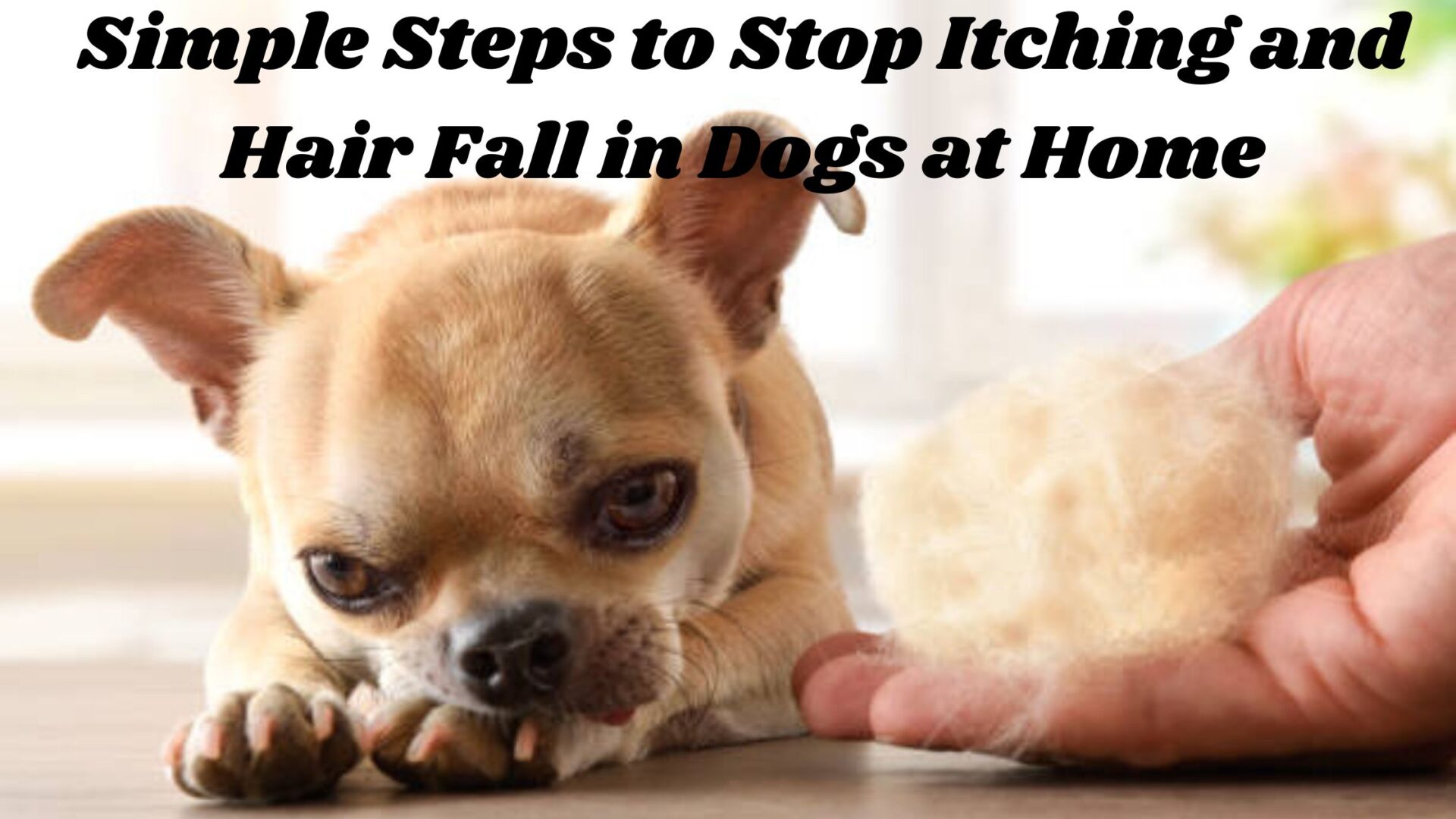Introduction:
Simple Steps to Stop Itching and Hair loss in Dogs at Home
The management of pruritis and alopecia in our cherished canine companions can be emotionally taxing. Fortunately, there are straightforward measures that can be implemented at home to mitigate these conditions and ensure the well-being and comfort of your dog. In this article, we present effective methodologies to address itching and hair fall in canines without the necessity for costly treatments or veterinary consultations.
What to do if Itching and Hair Loss in Dogs?
Effective Measures to Address Itching and Hair Loss in Dogs
If your dog is experiencing hair loss and itching, it’s crucial to take prompt action to alleviate these symptoms. Here are steps you can take:
- Consult a Veterinarian:
- Schedule an appointment with your veterinarian as the initial and most crucial step.
- Hair loss and itching can result from various medical conditions requiring an accurate diagnosis through a thorough examination and diagnostic tests.
- Follow Veterinarian’s Recommendations:
- Once the root cause is identified, adhere to the veterinarian’s treatment recommendations.
- Insect-Proof Your Pets: Rainy Weather Safety StrategiesThese may include medications, topical treatments, dietary changes, or allergy management strategies.
- Maintain Regular Grooming:
- Keep your dog’s coat clean and well-groomed to reduce itching and prevent further hair loss.
- Brush regularly and bathe with a gentle, hypoallergenic shampoo as advised by your veterinarian.
- Implement Flea and Tick Prevention:
- If fleas or ticks are contributing factors, use veterinarian-approved prevention products to eliminate these parasites and prevent future infestations.
- Address Environmental Allergens:
- Minimize exposure to environmental allergens like pollen or dust mites by keeping your home clean, using air purifiers, and avoiding outdoor activities during peak allergy seasons.
- Provide a Balanced Diet:
- Ensure your dog receives a balanced and nutritious diet to support overall health and skin condition.
- Consult your veterinarian for diet recommendations based on your dog’s age, breed, and health issues.
- Offer Comfort:
- Provide comfort and relief from itching during treatment.
- Avoid using harsh chemicals or irritants on the skin, provide soft bedding, and consider using cool compresses or soothing oatmeal baths to alleviate discomfort.
- Monitor Progress:
- Keep track of your dog’s symptoms and monitor their progress closely.
- If there are any changes or worsening of symptoms, consult your veterinarian promptly for further evaluation and adjustments to the treatment plan.
By proactively implementing these steps and working closely with your veterinarian, you can effectively manage your dog’s hair loss and itching, improving their quality of life.
What is the best home remedy for Itching and Hair Loss in Dogs?
There are several home remedies that can help alleviate itching in dogs. However, it’s important to note that the effectiveness of these remedies may vary depending on the underlying cause of the itching. Here are some commonly recommended home remedies for itchy skin in dogs:

- Oatmeal Bath: Oatmeal has soothing properties that can help relieve itching and irritation in dogs’ skin. To make an oatmeal bath, grind plain, unflavored oats into a fine powder. Mix the oat powder with warm water to create a soothing paste. Bathe your dog with this mixture, gently massaging it into their skin. Rinse thoroughly.
- Apple Cider Vinegar Rinse:Apple cider vinegar has antibacterial and antifungal properties that can relieve itching and soothe irritated skin. To use, dilute apple cider vinegar with water in a 1:1 ratio and apply it as a rinse after bathing your dog. Avoid using vinegar on open wounds or sores, as it may cause stinging.
- Coconut Oil: Coconut oil can hydrate dry, itchy skin and reduce inflammation. Apply a small amount to your dog’s skin, especially dry or irritated areas. Use virgin or unrefined coconut oil. Watch for signs of sensitivity or allergic reaction.
- Chamomile Tea: Brew a robust and fragrant chamomile tea, allowing its steam to permeate the air with a soothing aroma. Once the tea has cooled to a temperature gentle enough for your dog’s skin, gently apply it using a soft and absorbent clean cloth or a cotton ball. Alternatively, transform your dog’s bath into a tranquil spa-like experience by adding chamomile tea to the water, creating a soothing soak that will leave your furry friend feeling relaxed and refreshed.
- Aloe Vera: Enriched with soothing and intensely hydrating properties, aloe vera gel stands as a remarkable natural remedy for alleviating the discomfort of itching and irritation that plagues dogs’ sensitive skin. To ensure its effectiveness, opt for pure, unscented aloe vera gel, devoid of any additional substances. Apply this directly to the affected areas of your dog’s skin, paying meticulous attention to the regions that exhibit intense itching or visible inflammation. Exercise utmost caution to avoid aloe vera products that harbor potentially harmful additives, such as alcohol, which can exacerbate dryness and further irritate the delicate skin of your canine companion.
- Omega-3 Fatty Acids: Enhancing your dog’s diet with omega-3 fatty acid supplements can dramatically improve skin health and significantly reduce the discomfort of persistent itching. These essential nutrients, renowned for their profound impact on canine well-being, are readily available at reputable pet stores in formulations specifically tailored to meet the unique needs of dogs. Alternatively, you can seek guidance from your trusted veterinarian, who can provide expert recommendations on the optimal dosage and administration methods to ensure maximum efficacy.
Regular Baths: Regularly bathing your dog with a gentle, hypoallergenic shampoo can help remove allergens and irritants from their skin and coat, reducing itching and discomfort. While home remedies may offer temporary relief from itching, they may not address the root cause of the problem. If your dog’s itching persists or worsens despite home treatment, consult your veterinarian for a proper diagnosis and treatment plan.
What are the market products available for Itching and Hair Loss in Dogs?
There are numerous products available on the market specifically formulated to address hair fall and itching in pet dogs. These products vary in their formulations, active ingredients, and application methods. Here are some common types of products available:

- Medicated Shampoos: Medicated shampoos can help dogs with itchy, irritated skin. They contain ingredients like oatmeal, aloe vera, or tea tree oil to soothe the skin. Some shampoos also have antifungal or antibacterial agents to treat skin infections that cause itching and hair loss.
- Topical Treatments: There are different treatments for dogs that have itching and hair loss. These treatments can be sprays, mousses, gels, or spot-on solutions. They often have ingredients like hydrocortisone, lidocaine, or antihistamines. These ingredients help stop itching and swelling.
- Flea and Tick Control Products:Using effective flea and tick control products is important. These pests cause itching and hair loss in dogs. Spot-on treatments, oral medications, collars, or sprays kill and repel fleas and ticks, reducing itching and preventing hair loss.
- Supplements: Dog skin and coat supplements can improve skin condition and reduce shedding. They come in various forms, like chews, tablets, or liquids, and contain ingredients like omega-3 fatty acids, biotin, zinc, or vitamin E.
- Allergy Relief Products:If your dog has allergies that cause itching and hair loss, there are allergy products that can help. These may include antihistamines, corticosteroids, or immunomodulators prescribed by a vet.
- Skin Care Wipes: Skin care wipes designed for dogs are convenient for spot cleaning and soothing irritated skin. These wipes often contain gentle, hypoallergenic ingredients that can help remove allergens, dirt, and debris from your dog’s skin while providing relief from itching and inflammation.
Prescription Medications: Vets may prescribe medicines for severe itching and hair loss in dogs. These include antihistamines, corticosteroids, or immune-suppressing drugs. It’s important to consult your veterinarian before giving your dog any medication. Vets can find the problem and give personalized advice for your dog’s needs and history. Follow the instructions and dosage recommendations for any pet care products to ensure the best outcome for your furry friend.
Conclusion:
To effectively prevent itching and hair loss in your dog at home, follow these straightforward steps. Always prioritize your dog’s well-being. Consult with your veterinarian if you have any questions or concerns about the health of your dog’s skin and coat. With proper care and attention, you can ensure that your dog looks and feels its best for many years to come.
References
- American Kennel Club (AKC) – Dog Itching: Causes and Home Remedies
- ASPCA – Flea Control and Prevention
- PetMD – How to Treat Your Dog’s Dry, Flaky Skin
- VCA Hospitals – Pruritus (Itching) in Dogs
